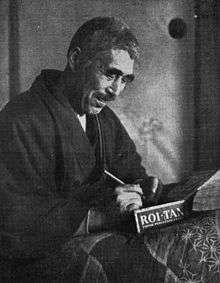Kiyoshi Nobutoki
| Kiyoshi Nobutoki | |
|---|---|
 Kiyoshi Nobutoki (shot in 1949) | |
| Born |
29 December 1887 |
| Died |
1 August 1965 (aged 77) |
| Other names | 信時 潔 |
| Occupation | composer |
Kiyoshi Nobutoki (信時 潔, Osaka, 29 December 1887 – Tokyo, 1 August 1965) was a Japanese composer, teacher and cellist.
His pupils include Kan'ichi Shimofusa, Kunihiko Hashimoto, Saburō Takata, Midori Hosokawa(細川碧), Yoshio Hasegawa(長谷川良夫), Taijiro Goh(呉泰次郎), Megumi Ohnaka(大中恩), Toshio Kashiwagi(柏木俊夫).
Works, editions and recordings
- Umi Yukaba (海行かば) 1937 - patriotic song (gunka) based on a waka poem by Ōtomo no Yakamochi in the Man'yōshū.[1][2]
- Song cycle Sara (沙羅) - recording by Kazumichi Ohno (tenor), Kyosuke Kobayashi (piano). Thorofon CD. 1994[3]
- String Quartet (1922)
- Cantata "Kaido-tosei (Along the Coast, Conquer the East)", text by Hakushū Kitahara, based on Nihon Shoki (1940)
Awards and honours
Translated from the Japanese Wikipedia article
- Member of the Japan Academy of Art (1942)
- Asahi Prize (1943)
- Person of Cultural Merit (1963)
- Order of the Rising Sun, Gold Rays with Neck Ribbon, Third Class (1964)
References
- ↑ Jesús González Valles, Filosofía de las artes japonesas. Artes de guerra y caminos de paz Page 127 - 2008 "Unas palabras del poema, “Umi yukaba” (Si voy al mar), inspiraron al Ministerio de Marina japonés un himno oficial en 1880, y al compositor Nobutoki Kiyoshi (1887-1965), una famosa canción en 1937."
- ↑ Emiko Ohnuki-Tierney — Kamikaze, Cherry Blossoms, and Nationalisms Page 139 2002 "In 1937 Nobutoki Kiyoshi composed a melody to accompany lyrics from a long poem from the Man'yōshū by Ōtomo no Yakamochi (716–785), who was in charge of the imperial guards (sakimori) in ancient Japan."
- ↑ Japanese sung texts and English and German commentary
This article is issued from
Wikipedia.
The text is licensed under Creative Commons - Attribution - Sharealike.
Additional terms may apply for the media files.